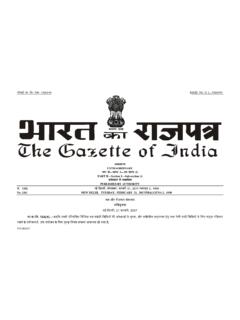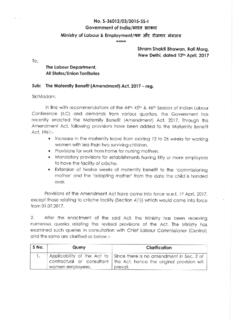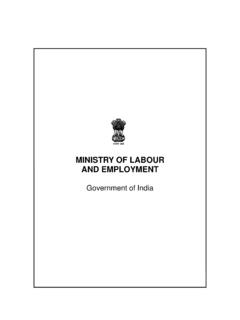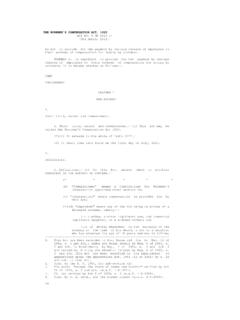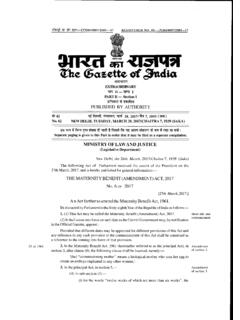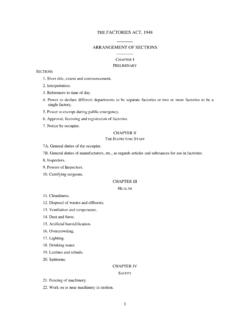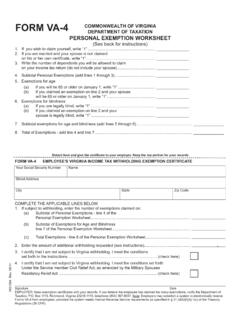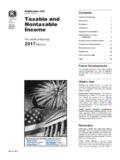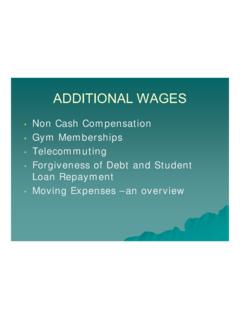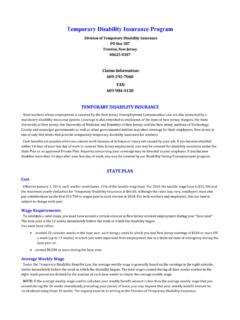Transcription of Maternity Benefit Act, 1961 - Ministry of Labour and ...
1 Maternity Benefit ACT, 1961. (No. 53 of 1961)1. [12th. December, 1961]. An Act to regulate the employment of women in certain establishment for certain period before and after child-birth and to provide for Maternity Benefit and certain other benefits. Be it enacted by Parliament in the Twelfth Year of the Republic of India as follows: - 1. Short title, extend and commencement. -- (1) This Act may be called the Maternity Benefit Act, 1961. (2) It extends to the whole of India 2[* * *]. (3) It shall come into force on such date as may be notified in this behalf in the Official Gazette, -- 3. [(a) in relation to mines and to any other establishment wherein persons are employed for the exhibition of equestrian, acrobatic and other performances, by the Central Government, and]. (b) in relation to other establishments in s State, by the State Government.
2 NOTES. This Act came into force in relation to mines in the territories to which it extends on the 1st. November 1963 Vide No. 2920, dated 5th. October, 1963, published in the Gazette of India, Part II, Sec. 3 (ii), dated 12th. October, 1963. This Act came into force in the whole of Uttar Pradesh with effect from 22nd. February 1974, vide notification No. 512 (V)-2/36-5-13 (V) 72, dated 22nd. February 1974. 2. Application of Act. -- (1) It applies in the first instance, to every establishment being a factory, mine or plantation 4[including any such establishment belonging to Government and to every establishment wherein persons are employed for the exhibition of equestrian, acrobatic and other performances]: Provided that the State Government may, with the approval of the Central Government, after giving not less than two months' notice of its intention of so doing, by notification 1.
3 Received the assent of the President on the 12th. December, 1961 and published in the Gazette of India, Extraordinary, dated 13th. December 1961. For Statement of Objects and Reasons see Gazette of India, Extraordinary, Part II, dated 6th. December 1960. 2. Words except the State of Jammu and Kashmir omitted by Act 51 of 1970, Sec. 2 and Sch. 3. Subs. by Act 52 of 1973, Sec. 2, 1-3-1975 Vide notification No. 113A (E), dated 27-2-1975. 4. Subs. by Aci 52 of 1973, In the official on In the official Gazette, declare that all or any of the provisions of this Act shall apply also to any other establishment or class of establishments, industrial, commercial, agricultural or otherwise. (2) 5[Save as otherwise provided in 6[sections 5A and 5B] nothing contained in this Act]. shall apply to any factory or other establishment to which the provisions of the Employees' State Insurance Act, 1948 (84 of 1948), apply for the time being.
4 3. Definitions. -- In this Act, unless the context otherwise requires, -- (a) appropriate Government means in relation to an establishment being a mine 7[or an establishment where persons are employed for the exhibition of equestrian, acrobatic and other performances], the Central Government and in relation to any other establishment, the State Government;. (b) child includes a still-born child;. (c) delivery means the birth of a child;. (d) employer means . (i) in relation to an establishment which is under the control of the Government, a person or authority appointed by the Government for the supervision and control of employees or where no person or authority is so appointed, the head of the department;. (ii) in relation to an establishment which is under any local authority, the person appointed by such authority for the supervision and control of employees or where no person is so appointed, the chief executive officer of the local authority.
5 (iii) in any other case, the person who are the authority which has the ultimate control over the affairs of the establishment and where the said affairs are entrusted to any other person whether called a manager, managing director, managing agent, or by any other name, such person;. [8(e) establishment means . (i) a factory;. (ii) a mine;. (iii) a plantation;. (iv) an establishment wherein persons are employed for the exhibition of equestrian, acrobatics and other performances; or 5. Subs. by Aci 21 of 1972, 6. Subs. by Act 53 of 1976, sec. 2, for section 5A . Act 53 of 1976 came into force 1-5-1976 Vide notification No. 337 (E), dated 30-4-1976. 7. Added by Act 52 of 1973, S. 4. 8. Subs. by Act 52 of 1973, S. 4. (v) an establishment to which the provisions of this Act have been declared under sub-section (4) of section 2 to be applicable;].
6 (f) factory means a factory as defined in clause (m) of section 2 of the Factories Act, 1948 (63 of 1948);. (g) Inspector means an Inspector appointed under section 14;. (h) Maternity Benefit means the payment refereed to in sub-section (1) of section 5;. (i) mine means a mine as defined in clause (j) of section 2 of the Mines Act, 1952. (35 of 1952). (j) miscarriage means expulsion of the contents of a pregnant uterus at ay period prior to or during the twenty-sixth week of pregnancy but does not include any miscarriage the causing of which ins punishable under the Indian Penal Code (45. of 1860);. (k) plantation means a plantation as defined in clause (f) of section 2 of the Plantations Labour Act, 1951 (69 of 1951);. (l) prescribed means prescribed by rules made under this Act;. (m) State Government in relation to a Union territory, means the Administrator thereof.
7 (n) wages means all remuneration paid or payable in cash to a woman, if the terms of the contract of employment, express or implied, were fulfilled and includes . (1) such cash allowances (including dearness allowance and house rent allowance) as a woman is for the time being entitled to;. (2) incentive bonus; and (3) the money value of the concessional supply of foodgrains and other articles, but does not include . (i) any bonus other than incentive bonus;. (ii) overtime earnings and any deduction or payment made on account of fines;. (iii) any contribution paid or payable by the employer to any pension fund or provident fund or for the Benefit of the woman under any law for the time being in force; and (iv) any gratuity payable on the termination of service;. (o) woman means a woman employed, whether directly or through any agency, for wages in any establishment.
8 NOTES. Sec 3 (f). A factory does not include a mine subject to the operation of the Mines Act, 152, or a railway running-shed. Sec. 3 (j) The definition of miscarriage is similar to the definition as given in Sec. 2. (14-B) of the Employees' State Insurance Act, 1948. 4. Employment of, or work by, women prohibited during certain period. -- (1) No employer shall knowingly employ a woman in any establishment during the six weeks immediately following the day of her delivery or her miscarriage. (2) No woman shall work in any establishment during the six weeks immediately following the day of her delivery of her miscarriage. (3) Without prejudice to the provisions of section 6, no pregnant woman shall, on a request being made by her in this behalf, be required by her employer to do during the period specified in sub-section (4) any work which is of an arduous nature or which involves long hours of standing or which in any way is likely to interfere with her pregnancy or the normal development of the foetus, or is likely to cause her miscarriage or otherwise to adversely affect her health.
9 (4) The period referred to in sub-section (3) shall be . (a) at the period of one month immediately preceding the period of six weeks, before the date of her expected delivery;. (b) any period during the said period of six weeks for which the pregnant woman does not avail of leave of absence under section 6. 5. Right to payment of Maternity Benefit . -- (1) Subject to the provisions of this Act, every woman shall be entitled to, and her employer shall be liable for, the payment of Maternity Benefit at the rate of the average daily wage for the period of her actual absence immediately preceding and including the day of her delivery and for the six weeks immediately following that day. Explanation. For the purpose of this sub-section, the average daily wage means the average of the woman's wages payable to her for the days on which she has worked during the period of three calendar months immediately preceding the date from which she absents herself on account of Maternity , or one rupee a day, whichever is higher.
10 (2) No woman shall be entitled to Maternity Benefit unless she has actually worked in an establishment of the employer from whom she claims Maternity Benefit for a period of not less than one hundred and sixty days in the twelve months immediately preceding the date of her expected delivery: Provided that the qualifying period of one hundred and sixty days aforesaid shall not apply to a woman who has immigrated into the State of Assam and was pregnant at the time of the immigration. Explanation: - For the purpose of calculating under this sub-section the days on which a woman has actually worked in the establishment, the days for which she has been laid-off during the period of twelve months immediately preceding the date of her expected delivery shall be taken into account. (3) The maximum period for which any woman shall be entitled to Maternity Benefit shall be twelve weeks, that is to say, six weeks up to and including the day of her delivery and six weeks immediately following that day: Provided that where a woman dies during this period, the Maternity Benefit shall be payable only for the days up to and including the day of her death.

